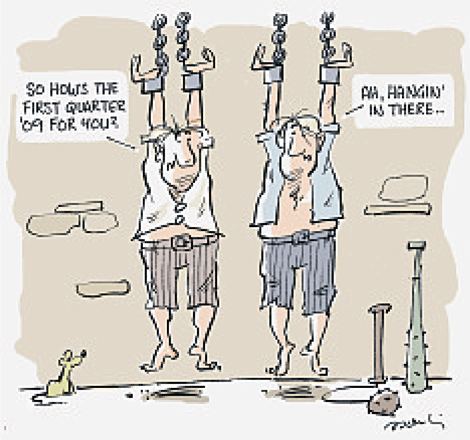Show must go on |
 |
| Marketers that put a clamp on ad spend will pay dearly when the economy improves, Brian McCarthy writes |
Last month, Steve Jobs announced his decision to take a five-and-a-half month break as Apple boss for health reasons. The market response was a loss of ten per cent on the stock value by week end as numerous commentators questioned how Apple would trade through the current difficult economic conditions without their inspirational leader.
It brought us back to October 23rd 2001, six weeks on from 9/11. Stock markets suffered dramatic losses; people on the street had fears about their safety and what the future held and a cloud of depression hung over New York spreading negative sentiment worldwide.
On that day, Jobs and Apple launched the iPod, an MP3 player that was to change the way we bought, stored and listened to music forever. ‘A landmark product' born in the middle of great economic uncertainty; a product that Apple put huge resources behind at a time when all around them were reducing costs and playing wait-and-see.
So what can we learn from the experience as we face into the difficulties of 2009? The iPod example shows us that there is still huge opportunity, there are still purchasers in the market, you just need to provide them with the reasons to buy your product.
Many businesses initial reaction is to cut ad spend to reduce costs, but is this a false economy? Many studies show that cutting budgets in a recession will badly affect your product not only during the downturn but afterwards where competitors have taken a greater market share and share of voice by continuing to promote their brand.
What is the cost of trying to reclaim your market share from competitors post recession? Or, the perceived damage to your brand strength if you cut back while you competitors show strength by maintaining their advertising spend?
McGraw-Hill Research analysed 600 US companies across 16 different industries from 1980 to 1985. Results showed that B2B firms that maintained or increased their ad spend during the 1981/'82 recession averaged much higher sales growth, both during the recession and for the next three years, than those that pulled back on advertising.

By 1985, sales in companies that were aggressive recession advertisers had risen 256 per cent over those that reduced or stopped advertising. It's vital to get the best return on ad spend so now is the time to investigate where budgets are best positioned.
The radio landscape has changed dramatically in recent years – niche stations, youth radio, new national stations, national urban alternatives and importantly a better research product in Mediastar, enabling clients to look closer at their target listeners.
Maybe there's new ways to look at planning radio to provide better targeting than just booking a national station and adding upweights. Is there more value in targeting your key areas using all the other options at your disposal, reaching more relevant audiences in more relevant markets? Clever sponsorship and promotional ideas can add more value to a campaign and provide a more subtle way of talking to consumers.
Even within demographics, is an ABC1 target enough or do we need to know more? A speaker at a marketing conference last year reminded us that the Archbishop of Canterbury and Boy George are both ABC1s, but the differences in character were highlighted with the latter's incarceration for falsely imprisoning a male escort.
The use of Mediastar and tools like SIG Data enable audience reach in a more focused way than was possible in any other economic downturn. The 3Rs of radio make it a cost effective tool to get the frequency and returns needed to sustain market position.
Reach is high at 85 per cent and has been consistent despite fears of reduced audiences due to MP3 players and other new gadgets. Even in the 15-24 technology-driven age demo, listenership is at 82 per cent and should grow with the new youth licences.
Relevancy is key to radio's success. Long listening hours and high solus listernership, particularly on local radio, show its importance in Irish daily life. In the car, the office, at home or even out and about, radio is available as a trusted companion.
Receptivity is vital for advertisers to get their message heard. In the US, an RAB study showed that 92 per cent of listeners stay tuned through the ad break and this in a market which has far more stations competing for listeners than we have in Ireland.
So why move away from marketing principles that have served so well at a time when they are most needed? Although it's hard to believe, judging by media reports, the downturn will not last forever and there is scope once budgets are used well.
There's going to be a growing market post-recession. How marketers react now could be key to a brand's market position then. As the saying goes: “When times are good, you should advertise. When times are bad, you must advertise”.
Brian McCarthy (brian@utvradio.ie ) is national sales manager for UTV Radio Solutions









